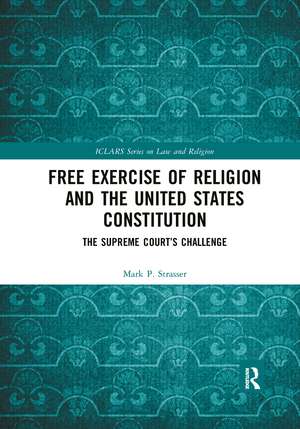Free Exercise of Religion and the United States Constitution: The Supreme Court’s Challenge: ICLARS Series on Law and Religion
Autor Mark P. Strasseren Limba Engleză Paperback – 11 noi 2019
This book attempts to clarify what the Court has said in the hopes that it will contribute to the development of a more consistent and principled jurisprudence that respects the rights of the religious and the non-religious.
| Toate formatele și edițiile | Preț | Express |
|---|---|---|
| Paperback (1) | 257.08 lei 6-8 săpt. | |
| Taylor & Francis – 11 noi 2019 | 257.08 lei 6-8 săpt. | |
| Hardback (1) | 819.90 lei 6-8 săpt. | |
| Taylor & Francis – 7 mar 2018 | 819.90 lei 6-8 săpt. |
Din seria ICLARS Series on Law and Religion
-
 Preț: 324.03 lei
Preț: 324.03 lei - 19%
 Preț: 259.51 lei
Preț: 259.51 lei -
 Preț: 312.12 lei
Preț: 312.12 lei -
 Preț: 317.95 lei
Preț: 317.95 lei -
 Preț: 310.95 lei
Preț: 310.95 lei -
 Preț: 387.75 lei
Preț: 387.75 lei -
 Preț: 284.78 lei
Preț: 284.78 lei -
 Preț: 385.47 lei
Preț: 385.47 lei - 18%
 Preț: 892.16 lei
Preț: 892.16 lei - 12%
 Preț: 303.22 lei
Preț: 303.22 lei - 18%
 Preț: 259.98 lei
Preț: 259.98 lei - 20%
 Preț: 259.98 lei
Preț: 259.98 lei -
 Preț: 386.51 lei
Preț: 386.51 lei -
 Preț: 387.87 lei
Preț: 387.87 lei - 17%
 Preț: 259.98 lei
Preț: 259.98 lei -
 Preț: 388.68 lei
Preț: 388.68 lei - 17%
 Preț: 259.92 lei
Preț: 259.92 lei - 18%
 Preț: 1001.07 lei
Preț: 1001.07 lei - 18%
 Preț: 1006.07 lei
Preț: 1006.07 lei -
 Preț: 381.59 lei
Preț: 381.59 lei - 17%
 Preț: 256.87 lei
Preț: 256.87 lei - 12%
 Preț: 299.25 lei
Preț: 299.25 lei - 17%
 Preț: 258.09 lei
Preț: 258.09 lei -
 Preț: 393.52 lei
Preț: 393.52 lei - 13%
 Preț: 298.19 lei
Preț: 298.19 lei - 18%
 Preț: 901.35 lei
Preț: 901.35 lei - 19%
 Preț: 255.66 lei
Preț: 255.66 lei - 18%
 Preț: 1000.27 lei
Preț: 1000.27 lei - 18%
 Preț: 1004.86 lei
Preț: 1004.86 lei - 18%
 Preț: 1004.41 lei
Preț: 1004.41 lei
Preț: 257.08 lei
Preț vechi: 309.90 lei
-17% Nou
Puncte Express: 386
Preț estimativ în valută:
49.19€ • 51.36$ • 40.62£
49.19€ • 51.36$ • 40.62£
Carte tipărită la comandă
Livrare economică 15-29 aprilie
Preluare comenzi: 021 569.72.76
Specificații
ISBN-13: 9780367893583
ISBN-10: 0367893584
Pagini: 168
Dimensiuni: 174 x 246 mm
Greutate: 0.31 kg
Ediția:1
Editura: Taylor & Francis
Colecția Routledge
Seria ICLARS Series on Law and Religion
Locul publicării:Oxford, United Kingdom
ISBN-10: 0367893584
Pagini: 168
Dimensiuni: 174 x 246 mm
Greutate: 0.31 kg
Ediția:1
Editura: Taylor & Francis
Colecția Routledge
Seria ICLARS Series on Law and Religion
Locul publicării:Oxford, United Kingdom
Public țintă
PostgraduateCuprins
Introduction; 1: Free exercise and the definition of religion; 2: Institutional autonomy and the ministerial exception; 3: Fighting wars and claims of conscience; 4: Early modern free exercise; 5: Free exercise becomes (more) chaotic; 6: The Smith revolution; 7: Corporate conscience; 8: Lower courts and the protection of religion;
Notă biografică
Mark Strasser is Trustees Professor of Law at Capital University Law School in Columbus, Ohio. His previous books include Religion, Education and the State: An Unprincipled Doctrine in Search of Moorings (2011), Same-Sex Unions Across the United States (2011), On Same-Sex Marriage, Civil Unions, and the Rule of Law: Constitutional Interpretation at the Crossroads (2002), The Challenge of Same-Sex Marriage: Federalist Principles and Constitutional Protections (1999), Legally Wed: Same-Sex Marriage and the Constitution (1997), Agency, Free Will, and Moral Responsibility (1992), The Moral Philosophy of John Stuart Mill: Toward Modifications of Contemporary Utilitarianism (1991), and Francis Hutcheson’s Moral Theory: Its Form and Utility (1990).
Recenzii
'Mark Strasser provides a fascinating and important analysis of the United States Supreme Court’s free exercise jurisprudence. He points out the Court’s failure to set and apply coherent standards, first under the Free Exercise Clause and later under RFRA. As a result, the lower courts have struggled to craft any sort of consistent doctrine under RFRA and under state RFRAs. Strasser explains that this works against accommodations for religious people and against those who oppose religious accommodation. This book is an important addition to the discussion of free exercise rights.'
Frank S. Ravitch, Michigan State University College of Law, USA
Frank S. Ravitch, Michigan State University College of Law, USA
Descriere
The United States Constitution’s protections for conscience, often described as robust, have in reality been of varying strengths, and the Supreme Court has offered specious rationales to justify the inconsistent application of differing standards while claiming to be consistently applying a single principle.
